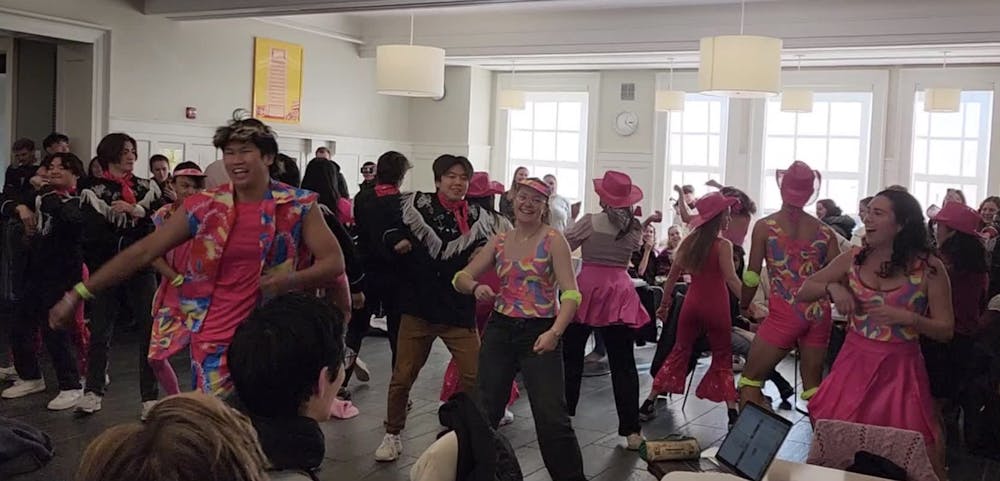Content warning: This article includes mentions of suicide.
On Wednesday afternoon before Thanksgiving break, unsuspecting students sitting in the Blue Room witnessed a group of around 25 people stand up, drop their trench coats to reveal neon pink Barbie and Ken costumes and dance in sync to “Dance the Night” by Dua Lipa.
But anyone familiar with Michael OuYang ’26 knows flash mobs are just one of many activities he intentionally engages in to publicly embarrass himself and his friends.
From serenading strangers in Andrews Hall to giving out free hugs and dressing up like a mermaid, OuYang is on a mission to provide a lighthearted moment to students who might be dealing with anxiety and depression.
These efforts are the newest element of OuYang’s nonprofit organization, No Empty Seats, which dates back to his high school years. According to OuYang, NES aims to spread awareness about mental health and raise money for suicide prevention.
During the flash mob — which performer Eva Kappas ’26 said took OuYang over a month to organize and included several practices and a dance rehearsal — performers passed out notes that read: “Good luck with finals and take care of yourself. Remember during this stressful time that you matter and someone out there is doing better because of you.”
“That’s something I’d want to hear if I was struggling during finals,” OuYang said.
OuYang shared that he has also struggled with mental health and suicidal thoughts. One message about mental health that has resonated with him came from a story his mom told him about her coworker’s son, who had passed away.
Whenever the coworker’s family celebrates the holidays “there’s always been one empty seat,” OuYang said. “It’s just in their face and they can never forget that absence.”
“No one will ever forget your absence, no matter what you think,” OuYang added. “And I realized from then on that I can’t engage in any self-harm or any suicidal ideations because I can’t leave my siblings. … I can’t leave my parents.”
NES was created to avoid more empty seats and “remind you to count your blessings because sometimes we get so caught up in life we forget how many good things are going on,” OuYang explained.
At first, NES focused on sharing “heartfelt (and) encouraging messages and posts,” OuYang said. Over time, OuYang decided “to bring (his) personality and humor to No Empty Seats.”
In March, OuYang began posting a series of videos to Instagram labeled “embarrassing myself until I stop giving a sh*t.”
The videos feature OuYang and his friends bleaching their hair, singing karaoke outside of Andrews Quad, wearing a diaper before getting publicly pantsed and walking through the Center for Information Technology wearing only a towel.
According to Lucas Gascon ’26, who attended OuYang’s high school and now also co-runs NES, watching “Michael do these challenges where he would put himself out there and get rid of his anxiety” helped him during his transition to Brown, a period which he described as “anxiety-inducing.”
“I feel like a goofball embarrassing myself … but it is really liberating once you realize that literally no one cares if you walk into the dining hall with something goofy like, say, a Yoshi costume on,” OuYang said. “People are gonna think, ‘Oh, that’s funny,’ and then go back to their lives.”
To support its humorous public challenges, NES raises funds from a few different sources.
OuYang said he has now recruited around 20 student athletes from Brown and other universities to be ambassadors for the cause — an effort that has raised around $1,500.
For Lexi Pellegrino ’26, an ambassador for NES and a member of the field hockey team, taking care of her mental health as a student athlete “can definitely be a lot sometimes.”
“Just the hours you have to put in every day, and when things aren’t going well athletically that can often translate to mental health issues and feeling alone,” she added.
In addition to raising donations with the help of student athletes, NES makes money from selling bracelets at around $3 a piece, each with a supportive message on it. “I’m proud to say we’ve sold around 5,000 bracelets,” OuYang said.
According to OuYang, 30% of the money raised is donated to the American Foundation for Suicide Prevention. The rest is kept to create “more mental health resources, whether that be pamphlets, funny videos, cards or merch.”
Ultimately, OuYang is trying to “make mental health cool, share stories, be vulnerable, inspire others and help myself.”
“Sometimes I’m in my head about these videos, about clothing, about clubs, classes and all of that, but then I try to remember why I started this organization to begin with,” he said. “It’s to share stories and make other people realize that everyone’s going through something. That’s it.”
Correction: A previous version of this story misstated the story that OuYang's mother told him. The Herald regrets the error.
Clarification: This article has been updated to add context to OuYang's quote about self-embarassment.

Katie Jain is a University News editor from New Jersey overseeing the graduate student life beat. She is a senior concentrating in International and Public Affairs and History.





